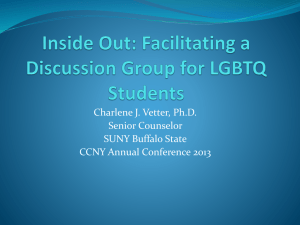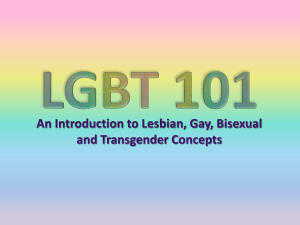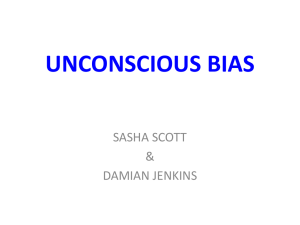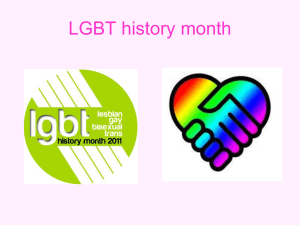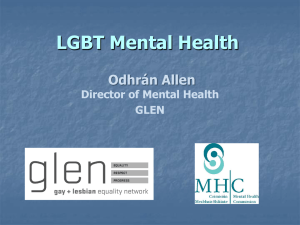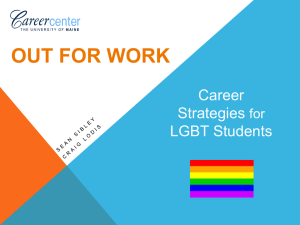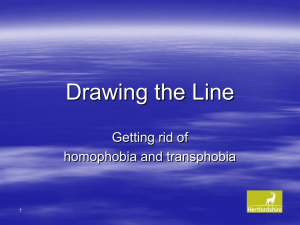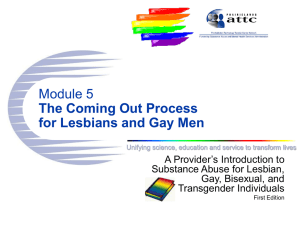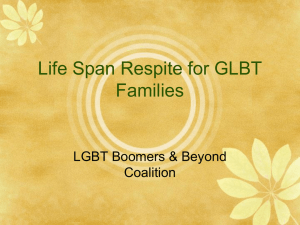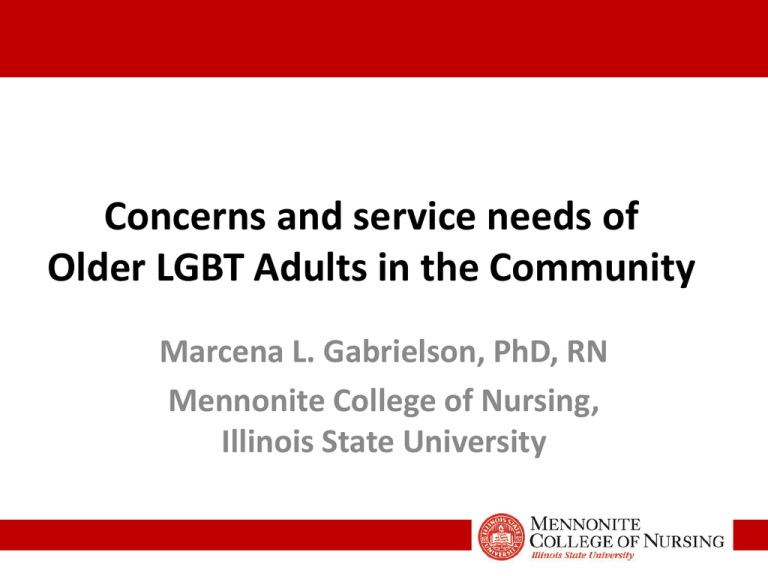
Concerns and service needs of
Older LGBT Adults in the Community
Marcena L. Gabrielson, PhD, RN
Mennonite College of Nursing,
Illinois State University
CONCERNS AND SERVICE NEEDS OF OLDER
LGBT ADULTS IN THE COMMUNITY
•
http://stumaddux.com/GEN_SILENT.html
RESPONDING TO THE NEEDS OF
OLDER LGBT ADULTS
http://vimeo.com/21668919
OLDER LGBT ADULTS
•
Recent estimates suggest that there are at least 1.5 million lesbian, gay and bisexual people 65 and older in the US, and
this population will double by the year 2030. T - See more at:
http://sageusa.org/issues/general.cfm#sthash.oCzsQjnA.dpuf
•
Many LGBT older adults deal with poverty and with reduced economic security. - See more at:
http://sageusa.org/issues/general.cfm#sthash.oCzsQjnA.dpuf
•
LGBT older people deal with significant health disparities across areas related to physical and mental health, including
high blood pressure, cholesterol, diabetes, heart disease, HIV/AIDS and more—as well as with serious mental health
concerns. - See more at: http://sageusa.org/issues/general.cfm#sthash.oCzsQjnA.dpuf
•
Social isolation affects many LGBT older people around the country as they deal with stigma and discrimination in their
daily lives and in our country's aging system - See more at: http://sageusa.org/issues/general.cfm#sthash.oCzsQjnA.dpuf
•
Many mainstream aging providers do not account for the unique realities and needs of LGBT older adults, leaving them at
risk for isolation, neglect and discrimination - See more at: http://sageusa.org/issues/general.cfm#sthash.oCzsQjnA.dpuf
•
LGBT-inclusive aging services help offset these problems by providing spaces for LGBT elders to find community and
support—but they are sparse and underfunded - See more at:
http://sageusa.org/issues/general.cfm#sthash.oCzsQjnA.dpuf
• http://sageusa.org/programs/nrc.cfm
HEALTHY PEOPLE 2020 INCLUDES:
LESBIAN, GAY, BISEXUAL, AND TRANSGENDER HEALTH
• Goal
• Improve the health, safety, and well-being of lesbian, gay,
bisexual, and transgender (LGBT) individuals.
http://www.healthypeople.gov/2020/topicsobjectives2020/overview.aspx?topicid=25
OVERVIEW
• LGBT individuals encompass all races and ethnicities, religions, and social classes.
• Research suggests that LGBT individuals face health disparities linked to societal
stigma, discrimination, and denial of their civil and human rights.
EFFORTS TO ADDRESS HEALTH DISPARITIES
AMONG OLDER LGBT PERSONS INCLUDE:
• Establishment of LGBT health centers
• Creating LGBT Task Forces within Area Agencies on
Aging
• Training for Older Adult Service Providers
UNDERSTANDING LGBT HEALTH
• Understanding LGBT health starts with understanding
the history of oppression and discrimination that these
communities have faced.
SOCIAL DETERMINANTS OF LGBT HEALTH
• Social determinants affecting the health of older LGBT individuals
largely relate to oppression and discrimination. Examples include:
• Legal discrimination in access to health insurance, employment, housing, marriage,
adoption, and retirement benefits
• Lack of social programs targeted to and/or appropriate for LGBT elders
• Shortage of health care providers who are knowledgeable and culturally competent in
LGBT health
PHYSICAL ENVIRONMENT FACTORS
• The physical environment that contributes to healthy Older
LGBT individuals includes:
• Safe neighborhoods and housing
• Access to recreational facilities and activities
• Availability of safe meeting places
• Access to health services
• Access to support caregiving and supports for caregivers
SUPPORTIVE CARE
•
http://vimeo.com/55651309
Resources for Discussion
http://www.lgbtagingcenter.org/resources/index.cfm?a=3
•
Aging Providers
•
Video Clips
Example Services
http://www.sageusa.org/
Training
http://www.lgbtagingcenter.org/training/index.cfm
http://www.bouldercounty.org/family/seniors/pages/projvis.aspx
http://www.lgbtagingcenter.org/resources/pdfs/NRC_guidebook.pdf
Recommendations for Older LGBT
Adult Services in our Area
Establishing a structured training for
older adult service providers
Creating an LGBT Task Force within the
Area Agency on Aging
Establishment of a Central IL LGBT
health center
•
Pass Out Provider Guidebook
Thank you!
DISCUSSION
BIBLIOGRAPHY
•
1McLaughlin KA, Hatzenbuehler ML, Keyes KM. Responses to discrimination and psychiatric disorders
among black, Hispanic, female, and lesbian, gay, and bisexual individuals. Am J Public Health.
2010;100(8):1477-84.
•
2Ibanez GE, Purcell DW, Stall R, et al. Sexual risk, substance use, and psychological distress in HIVpositive gay and bisexual men who also inject drugs. AIDS. 2005;19(suppl 1):49-55.
•
3Herek GM, Garnets LD. Sexual orientation and mental health. Annu Rev Clin Psychol. 2007;3:353-75.
•
4Remafedi G, French S, Story M, et al. The relationship between suicide risk and sexual orientation:
Results of a population-based study. Am J Public Health. 1998;88(1):57-60.
•
5Roberts AL, Austin SB, Corliss HL, et al. Pervasive trauma exposure among US sexual orientation
minority adults and risk of posttraumatic stress disorder. Am J Public Health. 2010 Apr 15.
•
6US Department of Health and Human Services. Healthy People 2010. [Internet]. Available from:
http://www.hhs.gov
•
7Gay and Lesbian Medical Association (GMLA). Healthy People 2010: A companion document for LGBT
health [Internet]. San Francisco: GMLA; 2001 Apr. Available from:
http://www.glma.org/_data/n_0001/resources/live/HealthyCompanionDoc3.pdf [PDF =- 2.3 MB]
•
8Centers for Disease Control and Prevention (CDC). Compendium of HIV prevention interventions with
evidence of effectiveness [Internet]. Atlanta: CDC; 2007. Available from:
http://www.cdc.gov/hiv/resources/reports/hiv_compendium/index.htm
•
9Suicide Prevention Resource Center. Suicide risk and prevention for lesbian, gay, bisexual, and
transgender youth. Newton, MA: Education Development Center, Inc.; 2009. Available from:
http://www.sprc.org/library/SPRC_LGBT_Youth.pdf[PDF - 418 KB]
10Steele LS, Tinmouth JM, Lu A. Regular health care use by lesbians: A path analysis of predictive factors. Fam
Pract. 2006;23:631-6.
11Sanchez NF, Rabatin J, Sanchez JP, et al. Medical students’ ability to care for lesbian, gay, bisexual, and
transgendered patients. Med Stud Edu. 2006;38(1):21-7.
12Ponce NA, Cochran SD, Pizer JC, et al. The effects of unequal access to health insurance for same-sex couples
in California. Health Affairs. 2010;29(8):1-10.
13Bux DA. The epidemiology of problem drinking in gay men and lesbians: A critical review. Clin Psych Rev.
1996;16:277-98.
14Garofalo R, Wolf RC, Wissow LS, et al. Sexual orientation and risk of suicide attempts among a representative
sample of youth. Arch Pediatr Adolesc Med. 1999;153(5):487-93.
15Conron KJ, Mimiaga MJ, Landers SJ. A population-based study of sexual orientation identity and gender
differences in adult health. Am J Public Health. 2010 Oct;100(10):1953-60.
16Kruks, G. Gay and lesbian homeless/street youth: Special issues and concerns. J Adolesc Health.
2010;12(7):515-8.
17Van Leeuwen JM, Boyle S, Salomonsen-Sautel S, et al. Lesbian, gay, and bisexual homeless youth: An eight-city
public health perspective. Child Welfare. 2006 Mar–Apr;85(2):151-70.
18Buchmueller T, Carpenter CS. Disparities in health insurance coverage, access, and outcomes for individuals in
same-sex versus different-sex relationships, 2000–2007. Am J Public Health. 2010;100(3):489-95.
19Dilley JA, Simmons KW, Boysun MJ, et al. Demonstrating the importance and feasibility of including sexual
orientation in public health surveys: Health disparities in the Pacific Northwest. Am J Public Health.
2010;100(3):460-7.
20Centers for Disease Control and Prevention. (CDC) HIV and AIDS among gay and bisexual men. Atlanta: CDC;
2010 Sept. Available from: http://www.cdc.gov/nchhstp/newsroom/docs/2012/CDC-MSM-0612-508.pdf [PDF - 291
KB]
•
21Struble CB, Lindley LL, Montgomery K, et al. Overweight and obesity in lesbian and bisexual college women. J Am
College Health. 2010;59(1):51-6.
•
22Herbst JH, Jacobs ED, Finlayson TJ, et al. Estimating HIV prevalence and risk behaviors of transgender persons in the
United States: A systematic review. AIDS Behav. 2008;(12):1-17.
•
23Whitbeck LB, Chen X, Hoyt DR, et al. Mental disorder, subsistence strategies, and victimization among gay, lesbian, and
bisexual homeless and runaway adolescents. J Sex Research. 2004;41(4):329-42.
•
24Diaz RM, Ayala G, Bein E, et al. The impact of homophobia, poverty, and racism on the mental health of gay and bisexual
Latino men: Findings from three US cities. Am J Public Health. 2001;91(6):141-6.
•
25Kenagy GP. Transgender health: Findings from two needs assessment studies in Philadelphia. Health Soc Work.
2005;30(1):19-26.
•
26National Gay and Lesbian Taskforce. National transgender discrimination survey: Preliminary findings. Washington, DC:
National Gay and Lesbian Taskforce; 2009 Nov. Available from:
http://www.thetaskforce.org/downloads/reports/fact_sheets/transsurvey_prelim_findings.pdf [PDF - 1.17 MB]
•
27Cahill S, South K, Spade J. Outing age: Public policy issues affecting gay, lesbian, bisexual and transgender elders.
Washington: National Gay and Lesbian Task Force; 2009 Nov.
•
28Lee GL, Griffin GK, Melvin CL. Tobacco use among sexual minorities in the USA: 1987 to May 2007: A systematic review.
Tob Control. 2009;18:275-82.
•
29Xavier J, Honnold J, Bradford J. The health, health-related needs, and lifecourse experiences of transgender Virginians.
Virginia HIV Community Planning Committee and Virginia Department of Health. Richmond, VA: Virginia Department of
Health; 2007. Available from:
http://www.vdh.virginia.gov/epidemiology/DiseasePrevention/documents/pdf/THISFINALREPORTVol 1.pdf [PDF - 646 KB]
•
30Hughes TL. Chapter 9: Alcohol use and alcohol-related problems among lesbians and gay men. Ann Rev of Nurs Res.
2005;23:283-325.
•
31Lyons T, Chandra G, Goldstein J. Stimulant use and HIV risk behavior: The influence of peer support. AIDS Ed and Prev.
2006;18(5):461-73.
•
32Mansergh G, Colfax GN, Marks G, et al. The circuit party men's health survey: Findings and implications for gay and
bisexual men. Am J Public Health. 2001;91(6):953-8.



